|

Liz
Mandeville has been on the Chicago blues
scene for several decades, but her recording
career got derailed four years ago when the
singer / guitarist was seriously injured in an
auto accident. The good news is that Mandeville
is back and just as strong as ever as heard on
her latest album, Playing With Fire (Blue
Kitty Music). This is guitar-driven blues but
with many surprises occurring on the five
different sessions, featuring a host of visiting
artists from around the world. Playing With
Fire is broken into the five segments in which
each guest artist is given their due.
My
preference is the two sessions that make up the
second half of the disc, with two cuts featuring
Boston blues violinist Ilana Katz Katz followed
by four country blues numbers with Dutch
guitarist Peter Struijk. But my preference for
these two groupings doesn't take
away from the quality heard on the other three
sessions that included Italian guitarist Dario
Lombardo, Mandeville regular band member Minoru
Maruyama, and guitarist Philippe Fernandez (aka
Big Dez) and harp player Gilles Gabisson, both
visiting from France. All songs here were written by
Mandeville with the support of her special
guests.
I
just love the two songs on which Katz Katz
appears, especially the old school
double-entendre blues, "He Loves My Biscuits,"
on which Mandeville sings, "...My baby loves my
biscuits with the butter running down ..." while
Katz Katz plays her fiddle and contributes
backing vocals. Katz Katz really shines on her
violin on "Just Give Her Chocolate" as
Mandeville tells us what women really, really
want.
Struijk's name is a new one to me, as it probably
is to most of our readers, but trust me when I
say that this cat can play a mean
guitar and resonator. He really lays down a
monster solo on "Poor Robert Johnson," with
Dizzy Bolinski coming in on harmonica.
Accompanied again by Struijk and Bolinski,
Mandeville belts out the blues on "Joliet Town."
Johnny Burgin sits in with a really fine guitar
solo on the John Lee Hooker-ish boogie number,
"Boss Lady," with Mandeville showing more than
the usual level of sass in her vocals.
My
absolute favorite number is "Hey Babe You Wanna
Boogie?," a rollicking, up-tempo old timey blues
with slide from Struijk, harmonica from
Bolinski, tuba from Steve Hart, and washboard
from Mandeville. This song reminded me of what
might have been heard nearly a century ago.
Among the other sessions, "Everybody Got Wings"
stands out, a jazzy, ethereal number highlighted
by tasteful slide guitar from Lombardo and
violin from Anne Harris. "Comfort Food Blues"
features Maruyama on slide, giving this number
more of a back porch feeling with Mandeville
singing about the real "vices" in her life. As someone
who always wears a pedometer to measure my daily
steps, I especially appreciate when Mandeville
sings about walking 10 thousand steps a day, but
that 500 of those steps are to her local French
bakery.
Big
Dez acquits himself well on guitar on the upbeat
blues, "Keep On Workin'," while Gabisson plays
nice harp on "How Many Times (Do You Get to
Break My Heart)."
It's
good to have another album from Mandeville, four
years after the equally outstanding The Stars
Motel. Playing With Fire just cements
her reputation as one of the Chicago's finest
contemporary blues artists.
--- Bill Mitchell
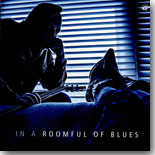 Roomful
of Blues is a band that's been around
forever --- or so it seems. My first
memory of Roomful was hearing a club ad on the
legendary WHFS radio station from Bethesda,
Maryland, in which the announcer quietly said
something like, "Open the door, and you're in a
roomful of blues," before being hit by a wall of
sound taken from their first album.
Coincidentally (or maybe not)
In A Roomful Of Blues (Alligator Records) is
now the name of their 21st album. With a 50-year
history and a sterling reputation despite
numerous personnel changes, Roomful of Blues is
still one of the best ensembles on the blues
scene. Hey, they must be doing something right
to be able to keep a big band together for that
long, with the quality of their sound never
dropping. Roomful
of Blues is a band that's been around
forever --- or so it seems. My first
memory of Roomful was hearing a club ad on the
legendary WHFS radio station from Bethesda,
Maryland, in which the announcer quietly said
something like, "Open the door, and you're in a
roomful of blues," before being hit by a wall of
sound taken from their first album.
Coincidentally (or maybe not)
In A Roomful Of Blues (Alligator Records) is
now the name of their 21st album. With a 50-year
history and a sterling reputation despite
numerous personnel changes, Roomful of Blues is
still one of the best ensembles on the blues
scene. Hey, they must be doing something right
to be able to keep a big band together for that
long, with the quality of their sound never
dropping.
Now
co-led by guitarist Chris Vachon and sax player
Rich Lataille, the latter who joined Roomful as
a teen way, way back in 1970, the list of
significant blues artists who have been members
of the band sounds like a "who's who" of the
blues world. To name just a few, Duke Robillard,
Ronnie Earl, Curtis Salgado Lou Ann Barton,
Sugar Ray Norcia, Greg Piccolo and Ron Levy have
been part of Roomful of Blues throughout its
history.
In
addition to Vachon and Lataille, the current
roster includes Phil Pemberton (vocals), Chris
Anzalone (drums), John Turner (upright bass),
Rusty Scott (keyboards, Alek Razdan (sax) and
Carl Gerhard (trumpet). Their sound is still as
tight and brassy as ever, with this album
reminding me of what I first heard from them
back in the late '70s.
The
title cut is a Vachon composition, a slower,
funky urban blues that turns into the
guitarist's chance to dominate the room with his
tasteful and incendiary playing. Pemberton turns
in some of his best work here, with strong and
soulful pleading vocals, easily making this cut
the highlight of the album.
But
wait --- the opening number, "What Can I Do?" a
Duke Records hit for Buddy Ace in 1961, is an
up-temp jump blues with hot piano playing from
Scott and a killer tenor sax solo presumably
from Lataille. Pemberton's voice here almost
sounds reminiscent of the early Roomful vocals
from Robillard. So maybe this song is the best
of the album, but then I'd be ignoring the slow
ballad "She Quit Me Again," with Anzalone very
tastefully using brushes on the drums while we
also get nice piano and sax breaks. I could
imagine Ray Charles having done this song
somewhere during his career.
Another keeper is the Rusty Scott original,
"She's Too Much," with a Latin beat and big
sound that takes us back to the big dance clubs
on the '40s. Pemberton really belts out the
jazzy blues here while either Lataille or Razdan
comes in with a strong sax solo. The Doc Pomus
original, "Too Much Boogie," is a rambunctious
jump blues that suits Pemberton's vocals to a T
while we also get a good trumpet solo from
Gerhard.
In A Roomful Of Blues closes with another
very hot up-tempo swing number, "I Can't Wait,"
written by Razdan who contributes a smokin' sax
solo. This song lasts only one minute and 53
seconds, but it sure packs a wallop in that
short time period.
I've
never heard a Roomful album that I didn't like
(and I've got a big chunk of their discography
in my collection), but In A Roomful Of Blues
ranks right up there among the best from this
venerable ensemble.
--- Bill Mitchell
 I've
never been sure how to categorize the music of
Austalian multi-instrumentalist / singer Harper,
as his music stretches multiple boundaries.
There's blues, but not always the standard
12-bar. He's soulful, too, and his use of the
traditional Aboriginal wind instrument
didgeridoo adds another unique twist to his
sound. In addition to the didgeridoo, Harper
also plays harmonica, keyboard and guitar. I've
never been sure how to categorize the music of
Austalian multi-instrumentalist / singer Harper,
as his music stretches multiple boundaries.
There's blues, but not always the standard
12-bar. He's soulful, too, and his use of the
traditional Aboriginal wind instrument
didgeridoo adds another unique twist to his
sound. In addition to the didgeridoo, Harper
also plays harmonica, keyboard and guitar.
Harper is also a fine songwriter, very heavy
into social issues, as heard on his latest CD,
Rise Up (Access Records), credited to
Harper
And Midwest Kind. I prefer the songs on
which he plays the didgeridoo, perhaps because
it adds such a unique sound. The title cut opens
the album with both drums and didgeridoo playing
before Harper's slide guitar and inspirational
vocals take over. He also plays the didgeridoo
on "Hateful," but it's his echo-y vocals that
add extra impact to the song as he preaches
against all of the hatred in the world today,
and the equally soulful "World's Insane."
Another very topical number is "Blues I Can't
Use," a mid-tempo number on which Harper
questions the constant spate of demagogues in
our current political environment, saying that
we can't just ignore the idiocy. Special guest
Paul Nelson contributes very nice slide guitar
here. Harper shows off his best harmonica work
on "Talk To Me" and the soulful "I Still Got
You," using the chromatic harp to good effect.
There aren't many other blues artists quite like
Harper, so those looking for something different
will want to check out Rise Up.
--- Bill Mitchell
 Altered Five Blues Band returns with the
aptly-titled Ten Thousand Watts (Blind
Pig Records), an electrifying set of rocking
soul and blues. The Milwaukee quintet (vocalist
Jeff Taylor, guitarist Jeff Schroedl, bassist
Mark Solveson, drummer Alan Arber, keyboardist
Ray Tevich) re-enlisted Tom Hambridge as
producer and returned to Nashville to assemble
these 12 original tracks that rank with the
band’s best work. Altered Five Blues Band returns with the
aptly-titled Ten Thousand Watts (Blind
Pig Records), an electrifying set of rocking
soul and blues. The Milwaukee quintet (vocalist
Jeff Taylor, guitarist Jeff Schroedl, bassist
Mark Solveson, drummer Alan Arber, keyboardist
Ray Tevich) re-enlisted Tom Hambridge as
producer and returned to Nashville to assemble
these 12 original tracks that rank with the
band’s best work.
Taylor’s big, powerful voice is in the spotlight
from beginning on the energetic opening boogie
shuffle, “Right On, Right On,” where the band is
ably assisted by harmonica player Steve Cohen.
The midtempo “Too Mad To Make Up” is a tale of a
lover scorned, and the title track is a muscular
blues that creatively revisits a common blues
theme ---.the sexual prowess of the blues man.
The funky “Mischief Man” is a raucous “don’t do
what I do” romp, and “Great Minds Drink Alike”
is an entertaining Windy City-styled shuffle.
The
slow burning tribute to the band’s genre of
choice, “Don’t Rock My Blues,” puts the guitar
work of Schroedl on full display, and “Sweet
Marie” ventures down to Louisiana for some tasty
second line funk. Taylor does some of his best
vocalizing on the ballad “Dollars & Demons,”
wrenching every drop of emotion possible, and
tears through “I Hate To Leave You (With A Six
Pack In The Fridge),” one of the more
interesting blues break-up songs in recent
memory.
“Let
Me Do The Wrong Thing” has a swampy, funky vibe
as Taylor finds himself losing the battle
against temptation, and the swinging “Half of
Nothing” sounds a bit like a country tune, both
lyrically and with Schroedl’s fretwork. The
album closes with Cohen rejoining the band on
“Let Me Be Gone,” a feisty blues rocker similar
in tone to the opening track.
Great songs, combined with Taylor’s robust
vocals, Schroedl’s versatile guitar, and the
rhythm section’s impeccable support, add up to
another winner for Altered Five Blues Band with
Ten Thousand Watts, the band’s best album
to date.
--- Graham Clarke
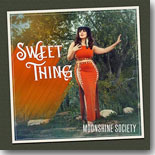 Sweet Thing, the second release from the
D.C.-based band Moonshine Society, won
this year’s Best Self-Produced CD at the I.B.C.,
and it’s pretty easy to hear why it won top
honors. Led by the charismatic singer/songwriter
Black Betty and powered by Blues Hall of Fame
guitarist Joe Poppen, this group is in their
tenth year of seamlessly merging the blues with
soul, rock, and R&B. Black Betty wrote five of
the ten tracks herself, while co-writing one
with the band and making the four choice covers
her own. Sweet Thing, the second release from the
D.C.-based band Moonshine Society, won
this year’s Best Self-Produced CD at the I.B.C.,
and it’s pretty easy to hear why it won top
honors. Led by the charismatic singer/songwriter
Black Betty and powered by Blues Hall of Fame
guitarist Joe Poppen, this group is in their
tenth year of seamlessly merging the blues with
soul, rock, and R&B. Black Betty wrote five of
the ten tracks herself, while co-writing one
with the band and making the four choice covers
her own.
The
title track opens the disc, slowly building to a
boil with Black Betty’s sultry vocal, Poppen’s
stinging guitar work, and guest Jason Ricci on
harmonica. The dance number “Shake” has a cool,
almost beach vibe with Poppen’s guitar and yakky
sax from Ron Holloway, and Ruth Brown’s “Mama,
He Treats Your Daughter Mean” takes on a
terrific, groovy second-line rhythm approach,
while the lush soul ballad “Come On Home” is a
tour de force for Black Betty, vocally and
lyrically.
The
rocker “Southern Road” serves as a tribute to
the late Johnny Winter, featuring more
outstanding lead work from both Poppen and
Ricci, and the gospel-flavored “Biscuits, Bacon,
& The Blues” reflects on all the things that are
most important in life (all three of those items
are pretty high on my list, anyway). The funky
mash-up of Bill Withers’ R&B hit “Use Me” and
Dr. John’s “Walkin’ On Gilded Splinters” (titled
“Use Me On Gilded Splinters”) is fantastic, too.
Black Betty’s version of Etta James’ “I’d Rather
Go Blind” stays faithful to the iconic original
version, but also allows the singer ample space
to showcase her own vocal chops to magnificent
effect, and her singing on the original “Deal
The Devil Made” seamlessly blends jazz and the
blues. The poignant ballad that closes the
album, “The One Who Got Away,” originally
appeared on the benefit album, “Cancer Can
Rock.”
The
I.B.C. Best Self-Produced CD award was well
deserved. Sweet Thing is a dynamite set
of blues and soul that deserves to heard.
Hopefully, blues fans will be hearing much more
from Black Betty and Moonshine Society soon.
--- Graham Clarke
 Polly O’Keary and the Rhythm Method’s
previous release, Black Crow Calling, was
a finalist in the 2017 I.B.C. Best Self-Produced
Album category and was their best studio effort
to date. The band recently released a live
album, As Live As It Gets, that captures
the band in fine form. O’Keary (bass/vocals) and
husband Tommy Cook (drums) served four years as
rhythm section for Too Slim & the Taildraggers,
and guitarist David Miller is a legend on the
West Coast music scene. Polly O’Keary and the Rhythm Method’s
previous release, Black Crow Calling, was
a finalist in the 2017 I.B.C. Best Self-Produced
Album category and was their best studio effort
to date. The band recently released a live
album, As Live As It Gets, that captures
the band in fine form. O’Keary (bass/vocals) and
husband Tommy Cook (drums) served four years as
rhythm section for Too Slim & the Taildraggers,
and guitarist David Miller is a legend on the
West Coast music scene.
The
entertaining 13-song set includes tunes from the
band’s previous releases along with several
well-chosen covers. The trio rips through “Red
Light,” “A Man Who Can Stand,” “I Don’t
Understand,” and the slow burning title track
from Black Crow Calling, “Stop, Train” from
2014’s Compass, “Sugar Daddy,” and the
title track from 2007’s Who Needs The Blues,
and “Hard Act To Follow” and the title track
from the band’s 2004 debut, Gather ‘Round Me
Angels.
The
band also does a splendid job on a pair of
Ronnie Earl tunes (“I Wish You Could See Me Now”
and “It’s My Soul”), and Eric Bibb’s “In My
Father’s House” (which appeared on Who Needs
The Blues). Miller takes the mic for a
magnificent extended read of “Old Love,” written
by Eric Clapton and Robert Cray for Clapton’s
1989 Journeyman album.
Recorded at three spots (Village Taphouse &
Grill in Maryville, Washington, Peabo’s Sports
Bar & Grill in Mill Creek, Washington, and the
Kamiah Hotel Bar & Grill in Kamiah, Idaho),
there’s no question that As Live As It Gets
captures Polly O’Keary and the Rhythm Method at
their finest, playing their best material in
front of several appreciative, enthusiastic
audiences.
--- Graham Clarke
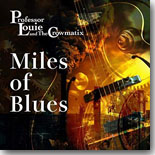 Professor Louie & The Crowmatix started out
as the studio backing band for Aaron L. Hurwitz
(a.k.a. “Professor Louiew York, the
Grammy-nominated group plays 150 shows a year
and have released 15 albums, their most recent
being Miles Of Blues (Woodstock Records),
which is subtitled “From L-50 to Steampunk and
Miles of Blues in between.” The ten-song set is
typical of the band’s previous work, which
skillfully blends blues, rock, gospel, and roots
music, featuring eight originals and two covers. Professor Louie & The Crowmatix started out
as the studio backing band for Aaron L. Hurwitz
(a.k.a. “Professor Louiew York, the
Grammy-nominated group plays 150 shows a year
and have released 15 albums, their most recent
being Miles Of Blues (Woodstock Records),
which is subtitled “From L-50 to Steampunk and
Miles of Blues in between.” The ten-song set is
typical of the band’s previous work, which
skillfully blends blues, rock, gospel, and roots
music, featuring eight originals and two covers.
The
opener, “L-50 Blues,” is a glorious tribute to
the Gibson guitar and its influence on the
blues, and guitarist John Platania gets ample
opportunity to display his slide guitar work on
the track. “Funky Steampunk Blues,” the next
track is just that with a down and dirty
backbeat that would make Bo Diddley proud. The
driving “Love Bound” reintroduces singer Miss
Marie, whose charms are described by the good
professor on the piano blues “Passion In My
Life.”
“Rain 40 Days” ventures into Crescent City
second line territory, describing the annual
ordeal of dealing with hurricane season, and the
lively traveling song “Exit Zero” finds
Professor Louie showing his keyboard chops. The
two cover songs appear next: first Miss Marie
gives a wonderful reading of Percy Mayfield’s
“Please Send Me Someone To Love,” and Professor
Louie covers “Orange Juice Blues,” a jaunty, but
seldom-heard tune from Richard Manuel that
originated during The Band’s Music From Big
Pink days.
The
Woodstock Horns make a prominent appearance on
the splendid slow blues “Oh My Lady,” and again
on the live track that closes the disc, “Bull
Frog Jam Blues,” a wild and entertaining
free-for-all that gives all the musicians ample
space to solo.
Music lovers are always guaranteed a good time
and some great music with every release from
Professor Louie & The Crowmatix, and Miles Of
Blues is no exception to the rule.
--- Graham Clarke
 For
her latest album, Down Yonder (Segue
Records), Vaneese Thomas recorded basic
tracks at Peaceful Waters Studios in New York,
enlisting among others, SNL drummer Shawn Pelton
and David Letterman bassist Will Lee, guitarist
Al Orlo and keyboardist Robbie Kondor. She then
traveled to her native Memphis, calling on
Lawrence “Boo” Mitchell and the Reverend Charles
Hodges, Bo-Keys co-founder/trumpeter Marc
Franklin, sax man Kirk Smothers, and her sister
Carla Thomas to add a bit of Bluff City grease
to the proceedings. For
her latest album, Down Yonder (Segue
Records), Vaneese Thomas recorded basic
tracks at Peaceful Waters Studios in New York,
enlisting among others, SNL drummer Shawn Pelton
and David Letterman bassist Will Lee, guitarist
Al Orlo and keyboardist Robbie Kondor. She then
traveled to her native Memphis, calling on
Lawrence “Boo” Mitchell and the Reverend Charles
Hodges, Bo-Keys co-founder/trumpeter Marc
Franklin, sax man Kirk Smothers, and her sister
Carla Thomas to add a bit of Bluff City grease
to the proceedings.
Down Yonder features a dozen originals,
leading off with the swampy funk of “Ebony Man,”
the story of a sharecropper where Thomas’
spirited vocal is punctuated by Tash Neal’s
understated dobro. On the horn-fueled soul
ballad “I Tried,” Thomas gives a powerful
performance, and on “Highway of Regret,” the
vibe moves seamlessly between country and soul,
thanks in part to Katie Jacoby. “Wake Me” is an
uptempo blue rocker, and the redemptive “Second
Chance” includes the familiar B3 “swoosh” of the
Reverend Hodges and backing vocals from Carla
Thomas and Berneta Miles.
The
heartfelt “Mama He Loves Me” is a prime showcase
for Thomas’ emotive vocals, and she doesn’t
disappoint,. “Lies” is a feisty, funky blues,
while on the ballad “Handle Me Gently” the
passion really builds as she takes her time with
the song and squeezes every drop of emotion from
it. The socially conscious “Legacy of Pain,” a
duet with Kevin Bacon, takes a pointed look at
unprosecuted, unsolved murders in Mississippi.
“Last Kiss” is pure Memphis soul at its best,
“Gone” is a great gospel piece that will light
your fire even if your wood is wet. The gospel
feel carries over to the title track, which
closes the disc on a goosebump-inducing note.
Down Yonder is a gloriously earthy mix of
blues, soul, gospel, and R&B. It’s another
typically winning set from Vanesse Thomas, who
continues to establish herself as one of the
best singers and songwriters currently
practicing.
--- Graham Clarke
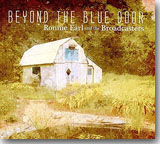 Beyond the Blue Door (Stony Plain Records),
the latest album by Ronnie Earl and the
Broadcasters, is described by the
award-winning guitarist as a “band album – a
community of souls with some guests, new
directions and good old down home blues…..” This
description is an apt one for any Ronnie Earl
album, to be honest, and certainly so for this
one, a sparkling 15-song set from the masterful
guitarist and band (keyboardist Dave Limina,
singer Diane Blue, bassist Paul Kochanski, and
drummer Forrest Padgett), also featuring a host
of musical guests. Beyond the Blue Door (Stony Plain Records),
the latest album by Ronnie Earl and the
Broadcasters, is described by the
award-winning guitarist as a “band album – a
community of souls with some guests, new
directions and good old down home blues…..” This
description is an apt one for any Ronnie Earl
album, to be honest, and certainly so for this
one, a sparkling 15-song set from the masterful
guitarist and band (keyboardist Dave Limina,
singer Diane Blue, bassist Paul Kochanski, and
drummer Forrest Padgett), also featuring a host
of musical guests.
The
opener, “Brand New Me,” was previously recorded
by Dusty Springfield and Aretha Franklin, among
others. Ms. Blue ably handles the vocals on this
classic old school track and Earl’s guitar work
is in the right place at the right time, as
always. Kim Wilson provides vocals and harmonica
on Howlin’ Wolf’s “How Long,” with keyboardist
Anthony Geraci and guitarist Peter Ward also
sitting in. Next up is a fabulous instrumental
reading of “Drown In My Own Tears,” with saxman
extraordinaire Greg Piccolo accompanying Earl’s
supremely soulful fretwork. The pair also
collaborated “Alexis’ Song,” with Earl returning
the favor, backing Piccolo on this brief, mellow
instrumental.
“The
Sweetest Man” is a breezy, mid-tempo shuffle
with Ward contributing on guitar, and Earl teams
with David Bromberg (who sings and plays
acoustic guitar) for an exquisite reading of Bob
Dylan’s “It Takes A Lot To Laugh, It Takes A
Train To Cry.” I first heard Earl’s “A Soul
That’s Been Abused” way back in the late 1980’s
on Hubert Sumlin’s Blues Party (sung by Mighty
Sam McClain --- if you missed this one, track it
down and you can thank me later). I believe
Earl’s guitar work is even better on this
extended version and Ms. Blue’s vocal rivals
McClain in soul and intensity.
Timmy Thomas’ “Why Can’t We Live Together” finds
Blue in a soulful mode with Earl and the
Broadcasters adding a funky edge to the tune.
Meanwhile, Wilson returns for another blues
standard, a slow burning take of Little Walter’s
“Blues With A Feeling” (with Ward and Scott
MacDougal guesting on guitar), and Earl
contributes a pair of fine instrumentals that
pay tribute to two blues icons: the swinging
shuffle “T-Bone Stomp” and the down home “Wolf
Song” (with Wilson and Geraci). Earl also dusts
off his own “Peace of Mind,” this version
highlighted by Blue’s smoky vocal and Earl’s
crisp guitar runs.
On
the old Joe Simon soul hit, “Drowning in a Sea
of Love,” Piccolo and fellow tenor saxophonist
Mario Perrett add spice to Earl’s fiery guitar
work. Bassist Kochanski contributed the topical
“Bringing Light (to a Dark Time),” and the album
closes with the pensive instrumental “Blues For
Charlottesville.”
Beyond The Blue Door covers a lot of musical
territory with blues, soul, R&B, and jazz. It’s
all presented with the style, class, and grace
that one has come to expect from a Ronnie Earl
and the Broadcasters release.
--- Graham Clarke
 Annika Chambers took home the 2019 Blues
Music Award for Soul Blues Female Artist of the
Year. Her third studio release, Kiss My Sass
(VizzTone Records) gives every indication that
the Houston-based singer might take the award
home in 2020 as well. The ten-song set only
features mostly covers, but Chambers’
interpretations make them seem autobiographical
at times. The effort was produced by Larry
Fulcher and Richard Cagle, with assistance on a
few tracks from Tony Braunagel and Kevin
Houston, and features a fine group of musicians
in support. Annika Chambers took home the 2019 Blues
Music Award for Soul Blues Female Artist of the
Year. Her third studio release, Kiss My Sass
(VizzTone Records) gives every indication that
the Houston-based singer might take the award
home in 2020 as well. The ten-song set only
features mostly covers, but Chambers’
interpretations make them seem autobiographical
at times. The effort was produced by Larry
Fulcher and Richard Cagle, with assistance on a
few tracks from Tony Braunagel and Kevin
Houston, and features a fine group of musicians
in support.
On
the opening shuffle, “Let That Sass Out,” Ms.
Chambers does just that, backed by the twin
guitars of The Mighty Orq and Corey Stoot. The
soulful “That’s What You Made Me” follows, also
loaded with sass, then the mid-tempo “You Can’t
Win,” originally from the musical, The Wiz
(performed by Michael Jackson). Next up is the
reflective gospel/soul of “What’s Your Thing,”
with Chambers asking listeners to look beyond
race to peace, love, and freedom. On this track,
she’s backed by Ruthie Foster on acoustic guitar
and background vocals and The Mighty Orq on
pedal steel.
Chambers pays tribute to Angela Strehli with a
dynamite cover of her “Two Bit Texas Town,”
which acknowledges Howlin’ Wolf and other blues
artists that opened the world of the blues to
her. “Brand New Day” is a slow blues that allows
Chambers to show her considerable vocal chops,
and “World Of Hurt” is a Memphis-styled soul
burner. She also does a magnificent job on
Carolyn Wonderland’s “Stay” (one of my favorite
songs that I’m surprised isn’t covered more
often), and the bluesy “In The Basement.”
Saving the best for last, Chambers closes with
Chris Smither’s “I Feel The Same,” a
stripped-down duet with Paul DesLauriers (who
also plays slide guitar) which captures each
singer’s distinctive vocal style perfectly.
Kiss My Sass is a most excellent set of
blues and soul that features Annika Chambers at
her very best. Chances are good that blues fans
will see her holding another trophy at this
year’s BMA’s, based on this sterling effort.
--- Graham Clarke
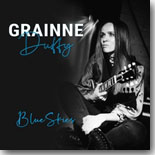 If
ever there was a time for optimism, positivity,
faith and hope, this is it as the world
experiences coronavirus blues. For blues fans
our beloved music is a lifeline, and because it
is shared with a global community we are never
alone. As John Lee Hooker reminded us in his
1989 comeback album The Healer, “The
blues is a healer all over the world, it healed
me it can heal you.” At a time of increasing
gloom and doom, it is important to look out for
and to share the green shoots of recovery. One
such moment is the single release, Blue Skies,
as Irish guitarist, songwriter and chanteuse
Grainne Duffy looks beyond the dark clouds
to those clear blue skies. This punchy, upbeat,
hard riffing blues rocking track stays in the
listener’s psyche for a long time, the perfect
antidote to current woes. If
ever there was a time for optimism, positivity,
faith and hope, this is it as the world
experiences coronavirus blues. For blues fans
our beloved music is a lifeline, and because it
is shared with a global community we are never
alone. As John Lee Hooker reminded us in his
1989 comeback album The Healer, “The
blues is a healer all over the world, it healed
me it can heal you.” At a time of increasing
gloom and doom, it is important to look out for
and to share the green shoots of recovery. One
such moment is the single release, Blue Skies,
as Irish guitarist, songwriter and chanteuse
Grainne Duffy looks beyond the dark clouds
to those clear blue skies. This punchy, upbeat,
hard riffing blues rocking track stays in the
listener’s psyche for a long time, the perfect
antidote to current woes.
A
compatriot of and spiritual successor to Rory
Gallagher, multi award-winning and Glastonbury
favorite Duffy has legendary status in her
native Ireland and beyond. Anyone not familiar
with her music should think Bonnie Raitt meets
Joe Walsh, to use an American analogy, but even
this comparison does a serious disservice to
Grainne’s distinctive musical identity. What
makes her unique is the innovative blend of
blues, rock, Americana, country and Celtic
influences, inspirational songwriting and
performances characterized by intense, emotional
vocals and dazzling fretwork.
The
infectious riff of “Blue Skies” precedes the
implosion of Grainne’s smoky, powerful vocals
reaching a crescendo with the chorus, “I got the
blue skies baby up above/I got the bright lights
burning and I just can’t get enough.” The singer
is clearly in a good place and enjoying the vibe
which she transmits with her trademark sincerity
and raw energy, complemented by atmospheric
background vocals. Duffy’s piercing guitar
interludes are timely and tasteful with
virtuosic guitarist Paul Sherry maintaining the
mesmeric pace and rhythm alongside the dynamic
drums of Troy Miller and bassist Dale Davis.
Grainne’s superb vocal range is evident as she
softens her voice to add drama to the
beautifully crafted lyrics which reflect the
happiness in her life and career. Grainne never
loses the pure joy of singing and she exudes the
cheerfulness we all need to reassure us at this
difficult time.
You
can hear more of Grainne Duffy on her highly
acclaimed 2017 album Where I Belong while
waiting for her new CD release later in the
year. For more info, check Duffy's website at
www.grainneduffy.com.
--- Dave Scott
|